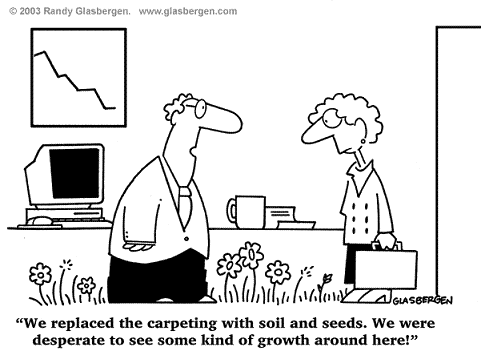If Content is King in the world of search, then blogs are the kingdom!
For those of you who blog for the purpose of generating additional sales of your products or services (as opposed to making affiliate revenues from the traffic), and have not yet seen the benefits, there is hope. Below follow 12 of the most common mistakes we find when we take over an account where the current owner(s) is (are) blogging. This is important as most of these bloggers ultimately get frustrated at the lack of results and give up on blogging entirely.
Here are the most common mistakes:
1. thinking people will actually read the post. Jakob Neilson performed a study and found found that only 16% of people will read a post word by word ... the rest only scan. The implication is that readers need to be able to extract the key message(s) of a post at a glance, and not have to work for it. This means posts must be made scannable. This also speaks to all the common mistakes found below.
2. using full paragraph format. Again, people don't want to read. They want to scan. If you can peak their interest first, then maybe they'll read, but almost certainly not if you present them with a mass of verbiage.
3. not using or numbering lists. Since readers do not like long paragraphs, and like easy to interpret and understand information, numbered lists do exceptionally well, as do point form lists. At a glance, people know how to interpret such lists, and can generally extract key information much quicker and with much less effort than paragraphs.
4. trying to sell something in a blog post. Blogs are a passive tool and NOT a pressure sales tactic. Readers have the ability to remain anonymous, and accordingly will leave immediately if they feel threatened or pressured. Instead, use your blog to instill trust and credibility and build authority. If readers trust you and find you credible ... then they may identify themselves as a sales opportunity.
5. not including facts. In reality, people do not really care about your opinion until you are more well known, and have established trust or credibility with them. The best way to do so and ultimately begin to establish trust and credibility is to reference other trusted sources, and to gradually expand on the concepts of those sources.
6. using improper titles. Titles are one of the most important elements of a blog post. They tell readers a great deal about the content, and often can be used to set expectations. All too often though, titles are too creative and vague rather than descriptive and enticing. Consider the human element too ... sure your post may appear in the search results or on a social media site, but unless its enticing and descriptive, its not going to have the desired effect.
7. writing for pHds (ie. using big words). This is a very common problem. All too often bloggers try to impress others with their vocabulary, and loose their readers as a result. Its also common to see writers using industry lingo and acronyms (which isn't a bad thing necessarily) if they're accompanied by descriptions.
8. making the post too long (over 800 words). I'm as guilty as the next person, but the reality again is that people DO NOT WANT TO READ!, they want to extract the key messages at a glance. The more words in a post, the less likely this goal becomes possible. So, live by the mantra LESS IS MORE!
Edit: this point has been very contentious as can be seen in the comments. Accordingly, I'd like to ammend this post to say that if a post is to exceed 800 words by any significant amount, there are 2 main options:
a. break the post into 2 or more posts
b. write the more detailed information in a web page (not a blog page), and refer to it from the blog post. The blog post could then act as a summary, peaking interest in the topic, which can then refer to the web page for those who wish to read more in depth. But give people the option!!!!! Case in point; not everyone needs to understand the ins and outs of the math behind Einstein's General Theory of Relativity, though most should have a general understanding of the concept, so why not explain the concept in a post, and provide the supporting math and assumptions in a separate detailed page referred to from the post.
9. repackaging existing information. ... but really adding nothing new or valuable to make the content truly unique! If readers continually find content on a blog that is written about elsewhere previously, and easily found elsewhere, why would they continue to read your blog? Instead, if you're publishing a post about recent industry news, add to it and show support for your perspective. Or alternatively, compile resources not already assembled.
10. no use of headings and subheadings. The use of headings and subheadings helps readers understand at a glance exactly how the post is organized and structured. Failure to do so often prevents readers from being able to determine what the key messages are at a mere glance.
11. highlight or bold important terms and concepts. Highlighting and bolding key concepts naturally draws the readers attention to them, making it easier for them to extract key post concepts. Failure to do so on the other hand means the reader has to work much harder to find the key concepts, and dramatically reduces the likelihood they actually will!
12. not using supporting images. So many people fail to use images, or use images that do not support their key messages. Again, readers need to be able to extract key messages at a glance, and if a picture can help convey that message using no words ... success! The image below is a case in point. I used it in a post to support my point that you've got to look at things from a different perspective, and the image itself encouraged many people to participate.

Edit: (thanks to Josh for suggesting this KEY point)
13. Introductory text should provide a very high level overview of the post. In order to manage reader expectations, proper descriptive titles are crucial, but so too are the first paragraph of a post. It should provide a high level summary of what readers can expect to learn, to entice them to continue on to look at more of the blog post.
In the end, if you're a blogger, try to make sure you're not making any of these mistakes and your likelihood of success increases substantially.
Ultimately it really comes down to "people want to be able to extract the key messages from a post in a glance", so give them what they want!
Question for you now ... what was the key message of this post? Just want to make certain I'm following my own principles.
I'm off now for a 2 week vacation ... yahoo! Enjoy ... and happy blogging!


